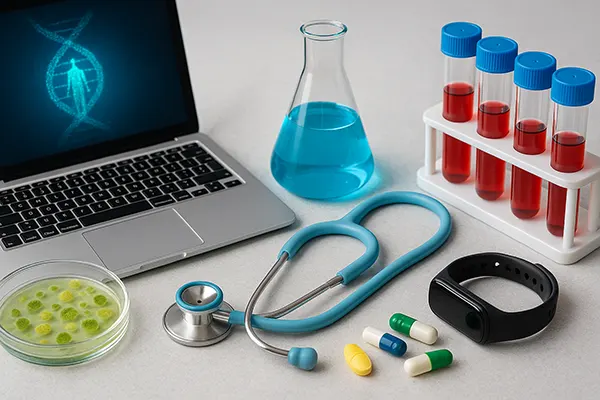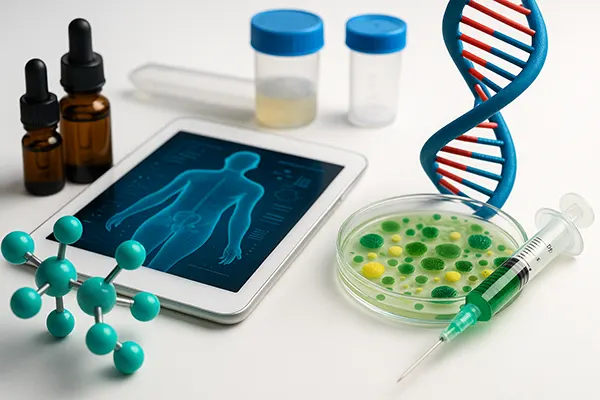Next-Generation Biohacking: Personalised Microbiomes and Genetic Health Tuning

In recent years, biohacking has shifted from a niche interest to a multidisciplinary field integrating biotechnology, genetics, nutrition, and medicine. The next frontier in human self-optimisation focuses on the individual — down to one’s genes and gut bacteria. With advances in sequencing technologies and AI-based diagnostics, personal health optimisation is no longer science fiction but tangible reality. This article explores how personalised microbiomes and genetic tuning are reshaping the health strategies of the 2020s and beyond.
The Rise of Personalised Microbiome Therapies
Microbiomes — the trillions of bacteria, viruses and fungi in our body — are increasingly recognised as key players in human health. They influence everything from metabolism and immunity to mood and cognition. What makes the next-gen approach revolutionary is the shift from generic probiotic use to highly individualised microbiome modulation based on DNA and stool analysis.
Thanks to precision diagnostics, it’s now possible to map an individual’s microbial profile in detail. Personalised interventions might include specific prebiotics, tailored diets, or custom probiotics designed to restore balance in a unique gut ecosystem. These methods are already showing promise in managing chronic conditions like IBS, obesity, and even depression.
Furthermore, targeted faecal microbiota transplantation (FMT) is gaining attention as a therapeutic method. When administered with accurate matching and safety protocols, FMT can reset a dysfunctional microbiome, showing particularly strong outcomes in treating recurrent Clostridium difficile infections.
Microbiome and Chronic Disease Management
Research in 2025 confirms that individual microbiome profiles are closely tied to the risk and progression of conditions like Type 2 diabetes, inflammatory bowel disease, and even autoimmune disorders. By analysing microbial signatures, healthcare providers can predict disease onset and personalise prevention strategies.
Customised microbiome plans also support the development of resilient gut flora after antibiotic treatments or illnesses. This targeted recovery process reduces the likelihood of dysbiosis and associated systemic effects, such as chronic fatigue or poor nutrient absorption.
Moreover, emerging studies suggest links between gut flora diversity and neurological health. Modulating microbiota could support treatments for neurodegenerative diseases, offering a novel avenue for tackling disorders like Parkinson’s and Alzheimer’s.
Genetic Health Tuning: Editing the Blueprint
Genetic tuning, distinct from full-scale gene editing, involves the adjustment of gene expression without altering the DNA sequence. Nutrigenomics, epigenetic interventions, and CRISPR-based gene modulation are becoming central to the biohacking toolkit in 2025.
Through affordable whole genome sequencing, individuals gain insights into their predispositions — from metabolic efficiency and nutrient absorption to stress resilience and sleep patterns. This information supports data-driven lifestyle planning, such as choosing the optimal training method or identifying foods that harmonise with one’s genotype.
Epigenetic tuning, often through methylation controls or microRNA influence, helps manage gene expression to optimise performance or reduce disease risks. Unlike irreversible editing, these changes are dynamic and reversible, providing safer ground for experimentation and therapeutic applications.
CRISPR and Preventive Health
While ethical concerns remain, CRISPR technologies are being refined for safe in vivo applications. By 2025, early-stage therapies target genes linked to cholesterol regulation, insulin sensitivity, and inherited cardiac conditions. Though mostly in clinical trials, outcomes show potential for widespread use in preventive care.
For athletes and high performers, gene modulation is being used experimentally to enhance mitochondrial function, muscle growth regulation, and oxygen utilisation. These developments are watched closely due to implications for doping and regulation, but the science behind them continues to evolve.
Importantly, ethical frameworks are catching up. Personal gene tuning, conducted under medical supervision, aligns with the broader movement towards proactive and personalised health management — not performance enhancement alone.

The Future of Personalised Biohacking
As technologies mature, the synergy between personalised microbiome analysis and genetic tuning is giving rise to fully individualised health regimes. This integration allows for proactive intervention before symptoms arise, significantly enhancing quality of life and longevity prospects.
Artificial intelligence now enables real-time health monitoring and adaptive intervention recommendations. From apps that adjust supplement doses based on wearable data to AI-driven microbiome platforms that adapt diets weekly, personal optimisation is becoming automated and continuously updated.
The consumer market is responding rapidly, with biotech startups offering at-home microbiome tests and gene reports. However, success hinges on robust regulation, data privacy protection, and ethical standards, especially when dealing with sensitive genomic and microbial data.
Responsible Innovation and Long-Term Impact
While the field grows, responsible innovation remains crucial. Transparency in clinical validation, secure data management, and medical oversight ensure that users benefit from reliable, science-backed insights rather than trends or pseudoscience.
Long-term, we can expect an increase in disease prevention, a shift from reactive treatment to proactive care, and enhanced resilience against ageing and environmental stressors. Biohacking becomes less about experimentation and more about sustainable, evidence-based optimisation.
Ultimately, the future of health is highly individual — mapped in our genes and coded in our microbiomes. With continued research and responsible implementation, next-generation biohacking may redefine how we live, age, and heal.
